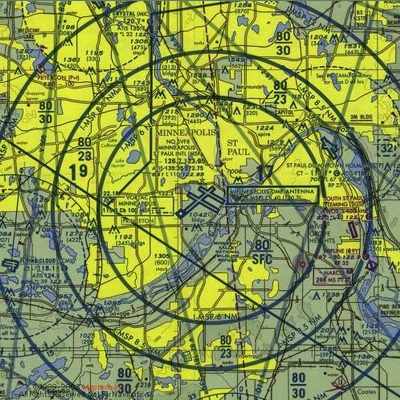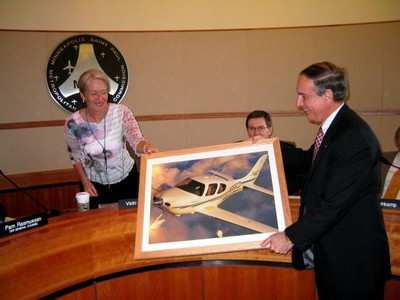Message: Don't Cave In To NWA Pressure On GA Flight
 Testifying before a Minneapolis
hearing room packed with AOPA members and local pilots, AOPA
President Phil Boyer Thursday told Twin Cities airport
commissioners "not to undo a system that is a model of efficient
capacity relief just because the largest tenant -- Northwest
Airlines -- at Minneapolis-St. Paul International (MSP) finds
itself in economic difficulty... again."
Testifying before a Minneapolis
hearing room packed with AOPA members and local pilots, AOPA
President Phil Boyer Thursday told Twin Cities airport
commissioners "not to undo a system that is a model of efficient
capacity relief just because the largest tenant -- Northwest
Airlines -- at Minneapolis-St. Paul International (MSP) finds
itself in economic difficulty... again."
Boyer appeared before the Metropolitan Airport Commission (MAC),
which runs Minneapolis/St. Paul International Airport (MSP) and six
GA reliever airports in the area. The MAC, which has increased
general aviation rents only once in the past 30 years, is currently
reviewing a range of reliever airport financing issues, largely due
to a lawsuit filed by Northwest Airlines and heavy political
pressure applied by the hometown-based hub airline. One option
under consideration by MAC Commissioners could raise general
aviation hangar rents at some relievers by as much as 700%.
Using research commissioned by AOPA from a consultant
well-versed in general aviation airport rates and charges, a phone
survey of AOPA members in Minnesota, and analysis by AOPA's
professional staff, Boyer challenged the basic assumptions driving
the proposed increases.
He said, "The turnout of AOPA members and pilots at this weekday
afternoon meeting was highly gratifying. It put faces to the
picture throughout the hearing of those who would be affected. Many
of these in attendance took time from their jobs to show concern in
very businesslike fashion."
Accompanying Boyer were AOPA Vice President of Regional Affairs
Roger Cohen and Vice President of Airports Bill Dunn. Dunn has been
involved in the Minneapolis airport situation for more than a year,
and last August hosted a meeting that more than 400 area pilots
attended.
While endorsing the MAC reliever concept, AOPA urged
Commissioners to consider other steps - such as better controlling
expenses and partnering with local communities to fund future
capital projects - before placing unreasonable rent increases
solely on the shoulders of local pilots. Citing the member survey
findings, he also suggested that AOPA members value preserving and
maintaining current infrastructure at the six airports, rather than
looking for expansion projects.

Boyer pointed to the MAC reliever airport system - largest of
its kind in the nation - as a unique asset to the Twin Cities area
and all of Minnesota, generating $1.4 billion in annual economic
activity. The GA airports provide access to and from the many
communities underserved or not served at all by airlines in
Minnesota, and they provide a training ground for the next
generation of airline pilots.
"They are also part of a system that improves safety at
Minneapolis/St. Paul International by taking smaller, slower
aircraft out of the way of airliners, and that saves the airlines
money by cutting down on delays - a key concern of passengers."
At Thursday's hearing, MAC officials reported that increased GA
operations at MSP could cost airlines more than $3 million annually
- more than double the amount MSP currently contributes to reliever
airport operations costs.
AOPA surveyed pilots at the MAC reliever airports and found that
the single-most important issue was maintaining the reasonable
rates and fees It ranked even higher than maintaining the runways
and taxiways. Coming as no surprise, more than 90% of the pilots
surveyed said either that there should be no increase in fees, or
that while a "minor" increase might be acceptable, the proposed
rates and fees are too high and they need to be phased in over
time. In addition more than 8 out of 10 pilots ranked snow removal
and airport maintenance as their number one and two concerns, and
less than a third indicated expensive runway expansions were
needed.

To prove its point, AOPA commissioned a study of rates and fees
at comparable airports. The results from the Aviation Management
Consulting Group survey found that the MAC's proposed increases
would make their rates four to six times higher than those at
comparable airports around the country.
Northwest Airlines officials appeared at the MAC session and
faced tough questioning by airport commissioners. The MAC staff is
expected to submit a formal recommendation and proposed general
aviation fee schedule on May 13, and the public will comment on the
proposal at a meeting in June.
 Classic Aero-TV: VerdeGo Debuts VH-3 Hybrid-Electric Powerplant
Classic Aero-TV: VerdeGo Debuts VH-3 Hybrid-Electric Powerplant NTSB Prelim: Grumman American Avn. Corp. AA-5B
NTSB Prelim: Grumman American Avn. Corp. AA-5B ANN's Daily Aero-Linx (12.02.25)
ANN's Daily Aero-Linx (12.02.25) Aero-News: Quote of the Day (12.02.25)
Aero-News: Quote of the Day (12.02.25) Aero-News: Quote of the Day (12.03.25)
Aero-News: Quote of the Day (12.03.25)





